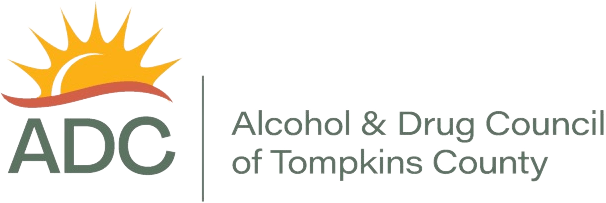We have a variety of clinical services available at The Alcohol and Drug Council. Below is a quick summary. For dates and times that groups are offered, please call: 607-274-6288. Groups are for admitted clients:
- Intensive Outpatient Therapy (9 hour a week program for individuals who are needing to focus on their recoveries in a frequent manner, combining an educational approach with a therapeutic process. Includes Just Say Yes To Fruits and Vegetables program**)
- Seeking Safety* (“An evidence-based, present-focused counseling model to help people attain safety from trauma and/or substance abuse. It directly addresses both trauma and addiction, but without requiring clients to delve into the trauma narrative (the detailed account of disturbing trauma memories), thus making it relevant to a very broad range of clients and easy to implement.”-cited from http://www.treatment-innovations.org/ss-description.html)
- Living in Balance* (“Living in Balance is a research based, flexible, practical, and user-friendly substance abuse treatment curriculum that helps clients address issues in lifestyle areas that may have been neglected during addiction. Living in Balance was developed by Danya International with funding from NIDA.” -cited from https://www.hazelden.org/HAZ_MEDIA/lib_insert.pdf)
- Women’s Way (“By drawing attention to how recovery raises special issues for women – from questions about sexuality and relationships to essential topics such as powerlessness, spirituality, and trauma – A Woman’s Way empowers women to take ownership of their recovery and to grow and flourish in sobriety.” -cited from http://www.stephaniecovington.com/a-womans-way-through-the-twelve-steps.php)
- Twelve Step Facilitation* (“Twelve Step Facilitation Therapy (TSF) is a brief, structured, and manual-driven approach to facilitating early recovery from alcohol abuse, alcoholism, and other drug abuse and addiction problems. TSF is implemented with individual clients or groups over 12-15 sessions.”- cited from: http://legacy.nreppadmin.net/ViewIntervention.aspx?id=358 . Men’s Group)
- Outside the Bars (Using material out of: “From the Inside Out and Beyond Anger Hazelden Life Series”. Outside the Bars is for men seeking to overcome criminal histories and to build a productive and emotionally-healthy life while on probation or parole.)
- Relapse Prevention Group* (“Relapse Prevention Therapy (RPT) is a behavioral self-control program that teaches individuals with substance addiction how to anticipate and cope with the potential for relapse. RPT can be used as a stand-alone substance use treatment program or as an aftercare program to sustain gains achieved during initial substance use treatment. Coping skills training is the cornerstone of RPT.”- cited from http://legacy.nreppadmin.net/ViewIntervention.aspx?id=97)
- ASURE- Adolescent group (A Hazelden-based group using their Co-Occurring Disorders Series, which looks at how substance addiction and mental health struggles often combine. ASURE offers tips on increasing coping, increasing health communication and the importance of creating healthy/sober social networks early on in a recovery process.)
- Stop the Chaos (A Hazelden-based group which offers“a comprehensive, practical guide, identifies the telltale signs of addiction, offers suggestions for living alcohol-or drug-free, and teaches the skills necessary for healthy thinking and living.” Cited from Hazelden publishing)
- Acceptance Commitment Therapy* (“Acceptance and Commitment Therapy (ACT) is a contextually focused form of cognitive behavioral psychotherapy that uses mindfulness and behavioral activation to increase clients’ psychological flexibility–their ability to engage in values-based, positive behaviors while experiencing difficult thoughts, emotions, or sensations. ACT has been shown to increase effective action; reduce dysfunctional thoughts, feelings, and behaviors; and alleviate psychological distress for individuals with a broad range of mental health issues (including DSM5 diagnosis (updated portion), coping with chronic illness, and workplace stress” -cited with a slight modification from http://legacy.nreppadmin.net/ViewIntervention.aspx?id=191).
- Dual Recovery Group (Dual Recovery Group offers an eclectic mixture of CBT, mindfulness-based and spirituality-boosting lessons and therapeutic exercises for individuals who identify that mental health needs are more serious and chronic in nature).
- Suboxone Therapy Group (For individuals who are receiving BMAT treatment*** (suboxone, Vivitrol injections or oral naltrexone), this group is a place to process issues specific to utilizing adjunctive therapies. This group uses a combination of work from Gorski, mindfulness-based relapse prevention and other current materials that inspire thought and self-reflection and overall wellness).
Some of our groups are gender-specific and other groups are mixed-gender. For individuals who are transgender, we suggest that they be placed in a group that most fits how they identify. All groups are integrated (look at both substance abuse and mental health issues and are trauma-sensitive.
*now listed on SAMHSA’s National Registry of Evidence-based Programs and Practices (NREPP)
** “The Just Say Yes to Fruits and Vegetables Program (JSY) encourages persons who receive food stamps to eat more fruits and vegetables by offering nutrition workshops, cooking demonstrations and other educational activities at food pantries, shelters, farmers’ markets, and other community settings.”
-cited from: https://www.health.ny.gov/prevention/nutrition/wic/just_say_yes_fruit_vegs.htm
*** “Buprenorphine is used in medication-assisted treatment (MAT) to help people reduce or quit their use of heroin or other opiates, such as pain relievers like morphine.” -cited from http://www.samhsa.gov/medication-assisted-treatment/treatment/buprenorphine
